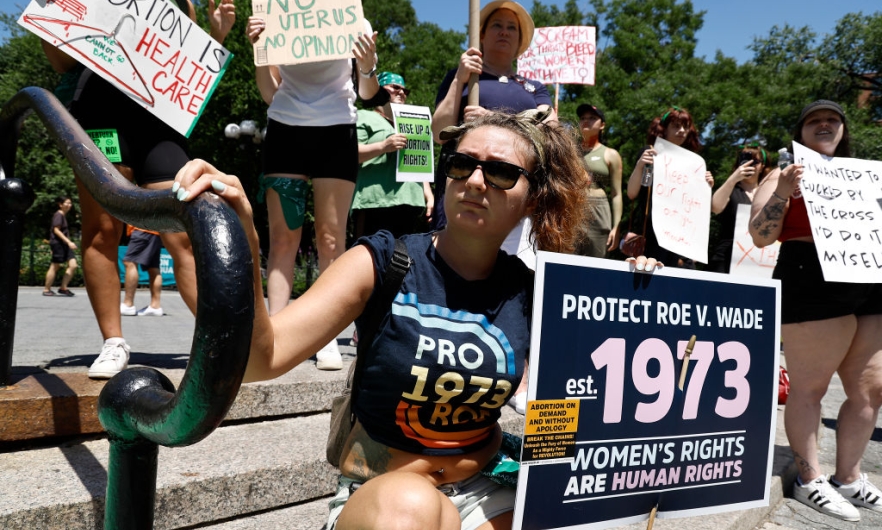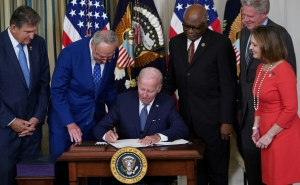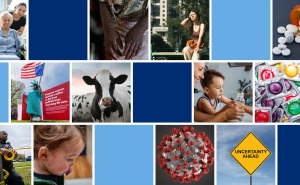How Abortion Trigger Laws Impact Mental Health
Abortion bans enacted after Dobbs have far-reaching impact on mental health, a new study shows.

The June 2022 Supreme Court ruling overturning Roe v. Wade upended the federal right to abortion that had been in place for 50 years, and handed the question of abortion rights over to individual states. Immediately following the Dobbs decision, 13 states activated trigger laws that had been lying in wait, promising to ban or restrict abortion in the event Roe was overturned.
How did those trigger laws impact the mental health of people in those states?
A recent analysis of national survey data conducted by Bloomberg School researchers found a small but statistically significant increase in self-reported anxiety and depression symptoms among respondents in states that banned abortion after the Dobbs ruling, compared to those in states that did not enact bans. The changes were most pronounced among females ages 18 to 45.
In a Q&A, lead author Benjamin Thornburg, a PhD candidate in Health Policy and Management, and senior author Matthew Eisenberg, PhD, Director of the Center for Mental Health and Addiction Policy, and associate professor in Health Policy and Management, say the findings illuminate the multi-faceted impact of the Dobbs decision. They also discuss how states can respond and how service delivery and even medical education may be affected by state abortion bans.
Why might the Dobbs decision be causing increased symptoms of anxiety and depression, even in women who aren't pregnant or currently being denied an abortion?
Benjamin Thornburg: There are lots of potential mechanisms at play. In the very important 1992 case, Planned Parenthood v. Casey, part of the Supreme Court's opinion was that reproductive autonomy was intimately related to personal and economic freedoms. Those can arguably be very related to mental health. I think that makes clear how individuals who aren't actively seeking an abortion may be concerned by the risks of living in a state where they—or someone they know—couldn't get one should they need one. Those risks can impact a person’s overarching sense of security. To have abortion rights—once protected by the federal government—evaporate in a day, is a troubling feeling.
What are the wider implications of these population-level increases in anxiety and depression?
Matthew Eisenberg: The immediate impact of the Dobbs decision was restricting abortion in a variety of states. But as this research shows, there's also second-order and third-order impacts of policies, and we can quantify those.
When states are considering new policies around reproductive health, they need to consider the broader mental health impact of these policies. There could be increased demand for mental health services or increased utilization down the line, specifically in states where abortion bans were enacted.
How do your findings add to the existing research on abortion bans and mental health?
BT: This is some of the first evidence we have following Dobbs that this policy of banning abortions—which wasn't specifically designed to impact mental health—does impact it. There are also implications for the delivery of mental health services.
The research that preceded the Dobbs decision was very focused on the mental health impact of abortion denial. One of the important implications of this research is that we're uncovering a similar pattern at the population level. That's troubling, especially in this era where reproductive policy is less certain than it was a few years ago.
The study says that you now plan to examine other potential impacts of Dobbs. What’s next?
BT: The next step is to look at Dobbs’ impact on the health care workforce, including the national residency match for medical graduates—a crucial step in the training process for doctors. We expect to see providers shift where they attend their training programs, and an immediate impact could be a change in the quality of the health care delivered [in states with abortion bans].
Historically, students have been willing to travel very far to attend their preferred residency program. Often, residents will stay and practice in the states where they got their training. But following Dobbs, residents may be less willing to attend a program in a state that has banned abortion. For example, aspiring OB-GYNs can't get the comprehensive training that they would have gotten previously in states with abortion bans, and that’s an explicit disincentive to attend those programs. There could be an accumulation of adverse impacts there.
Annalies Winny is a writer and producer at the Johns Hopkins Bloomberg School of Public Health.





